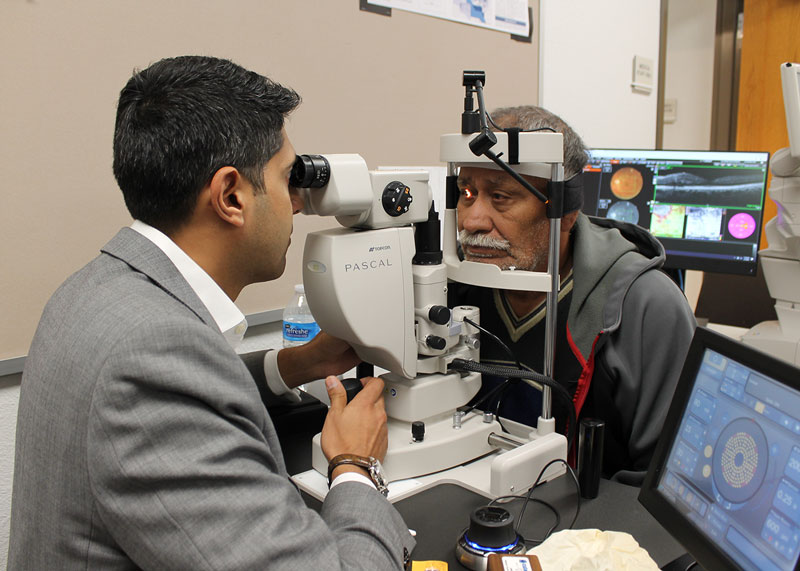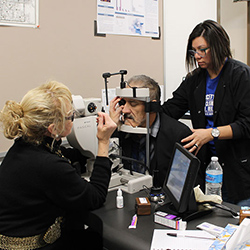
Physicians Perform Eye Surgery for Free on Uninsured Patients to Prevent Blindness

For the first time at St. Vincent de Paul’s Virginia G. Piper Medical and Dental Clinic, physicians performed a free-of-charge diabetic retinopathy laser treatment on uninsured patients with an eye disease that is the leading cause of blindness in the U.S.
The procedure was made possible due to the efforts of community physicians, including those at the University of Arizona College of Medicine – Phoenix. On Feb. 7, 2020, Mandi Conway, MD, interim chair of the Department of Ophthalmology, and Amit Sangave, MD, a clinical assistant professor of Ophthalmology, performed the first two eye laser treatments at the clinic.

Diabetic retinopathy is a diabetes complication that occurs when high blood sugar levels cause damage to blood vessels in the retina. The condition often causes visual loss. Currently, St. Vincent de Paul is the only location for free and readily obtainable diabetic eye disease screenings for uninsured patients, and now, they are able to treat and prevent this serious retinal disease. This treatment can cost thousands of dollars for the patients, which is all provided here free of cost.
Dr. Conway was introduced to the clinic by Robin Ross, MD, MPH, a clinical assistant professor in Ophthalmology and Bioethics and Medical Humanism at the college, and Aileen Villareal, MD, an ophthalmologist who volunteers her time at the clinic. Dr. Conway met with Maurice Lee, MD, MPH, chief medical officer of the St. Vincent de Paul Medical Clinic. After touring the facility and meeting with Dr. Lee, Dr. Conway knew this was something she needed to be a part of.
Through her industry connections, Dr. Conway was able to negotiate $90,000 of equipment needed to do the treatments, which was generously provided by The Thunderbirds.
“Prior to Dr. Conway recruiting her colleagues to start treatments, we were always hoping for a contact to come through saying they were willing and able to help,” Dr. Lee said. “We would get about $20,000 in grants or donations a year, but that would only treat a handful of patients, and then we were back at square one. With regular clinics, we can be that contact for the 40 plus safety net clinics that refer to us for diabetic retinopathy screening, effectively treating any uninsured patient who needs it.”
Dr. Conway said she would like to make this community outreach something that students, residents and faculty members in the Department of Ophthalmology at U of A College of Medicine – Phoenix can be part of. She said that our community has so many gifted and like-minded physicians who could go to the clinic and help these patients and really make a difference in their lives.
“This is so incredibly important because it’s an unmet need in our community,” Dr. Conway said. “I want our residents, providers, faculty members and community to know about this marvelous way to help people.”
She envisions future residents rotating at the clinic and getting hands-on experience with diabetic retinopathy. She sees it as a chance for young health care providers to also understand the needs of this population and their obligation, as physicians, to help them.
“It’s an obligation for every physician to help the underserved,” Dr. Conway said. “What’s the point of being a doctor if all you do is treat insured patients, when we are supposed to heal everyone?”
Dr. Conway added that even if you’re not a physician, there are ways to still support the medical center at St. Vincent de Paul, such as volunteering or donating.
About the College
Founded in 2007, the University of Arizona College of Medicine – Phoenix inspires and trains exemplary physicians, scientists and leaders to advance its core missions in education, research, clinical care and service to communities across Arizona. The college’s strength lies in our collaborations and partnerships with clinical affiliates, community organizations and industry sponsors. With our primary affiliate, Banner Health, we are recognized as the premier academic medical center in Phoenix. As an anchor institution of the Phoenix Bioscience Core, the college is home to signature research programs in neurosciences, cardiopulmonary diseases, immunology, informatics and metabolism. These focus areas uniquely position us to drive biomedical research and bolster economic development in the region.
As an urban institution with strong roots in rural and tribal health, the college has graduated more than 1,000 physicians and matriculates 130 students each year. Greater than 60% of matriculating students are from Arizona and many continue training at our GME sponsored residency programs, ultimately pursuing local academic and community-based opportunities. While our traditional four-year program continues to thrive, we will launch our recently approved accelerated three-year medical student curriculum with exclusive focus on primary care. This program is designed to further enhance workforce retention needs across Arizona.
The college has embarked on our strategic plan for 2025 to 2030. Learn more.